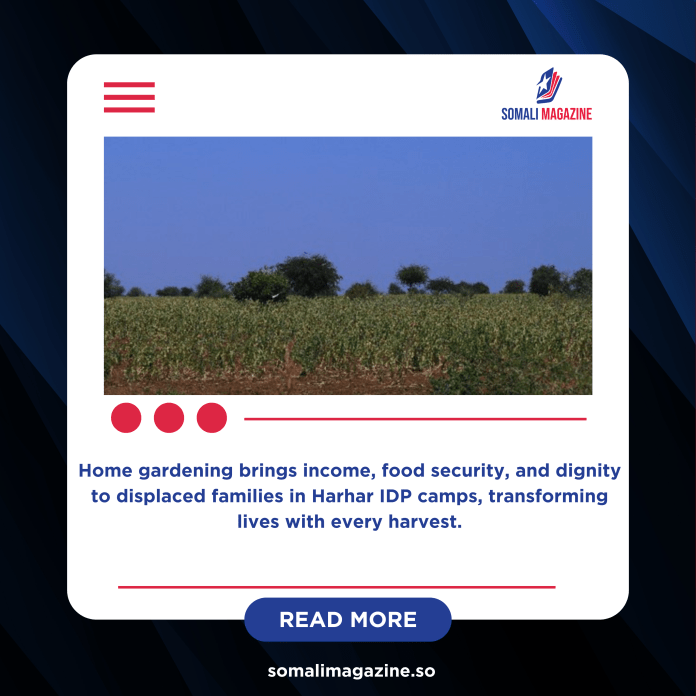Facebook Twitter (X) Instagram Somali Magazine - People's Magazine
In the Mudug region of Somalia, growing vegetables in small home gardens has brought new hope and income to displaced families living in camps. Thanks to a training program introduced earlier this year, many families are now earning a steady daily income and improving their quality of life.
In February, the Galkayo local government selected 70 families from 11 camps in Harhar, located north of Galkayo city, to receive training in home gardening. With support from the Norwegian Refugee Council (NRC) and the World Food Programme (WFP), the families were given tools, seedlings, and monthly follow-ups to help them succeed.
By May, families began harvesting vegetables like tomatoes, cucumbers, peppers, watermelons, bananas, and cabbages from small plots beside their shelters. These gardens have become more than just a food source — many families now make between $5 and $10 a day by selling their produce locally.
Darajo Abdi Ali, a mother of eight living in Bulonotayo camp, is one of the many success stories. Her family lost everything — 70 goats and 10 cows — in a drought in 2021 that forced them to leave Bay region. Today, she grows vegetables on a 30-square-meter plot and sells them at a small stall near her home.
“Now we have regular meals — breakfast, lunch, and dinner. Life is better. I used to spend my days away from my children trying to find work. Now I’m home, tending to my garden and caring for my family,” Darajo said.
She has already paid off half of her $800 grocery debt and can now afford to send her eldest daughter to high school. “Before, when she asked for money for books or uniforms, I used to feel hopeless. Now, I can give her everything she needs,” she added. Darajo dreams of expanding her garden and becoming a full-time businesswoman. Her husband, who has a chronic illness, cannot work.
In Mahad-Alle camp, Maryama Mohamed Ali is also seeing a positive change. She used to walk 8 km into Galkayo to find laundry or cleaning jobs, competing with others — often Ethiopian migrants — for low-paying work. Some days, she earned nothing.
Today, she no longer travels for work. Instead, she grows and sells vegetables from her garden. “It’s like our eyes were closed and now opened. I cook tomatoes and spinach from my garden, and we even make juice from our own watermelon. We feel happy and blessed,” Maryama shared.
She now earns a similar daily income of $5–10, enough to cook three meals a day, send her four children to free primary school, and buy supplies like uniforms and books. She has repaid half of her $600 debt and recently bought four goats to provide milk for her children.
“I will never again think of washing clothes! Now I sell vegetables from home. I’m finally able to take care of my family without constantly running around,” she said.
Like Darajo, Maryama’s family were once pastoralists. They lost their animals to the 2019 drought in Beletweyne, forcing them to move into an IDP camp in search of help.
According to Haruse Osman Dahir, the government’s displacement coordinator, the goal of the gardening program is to reduce reliance on aid by teaching practical skills. “These were the most vulnerable people — widows, orphans, and people with disabilities. Now they’re able to support themselves,” he said.
Agricultural officers say that with the right knowledge and market access, small-scale farming like this can help displaced families break free from poverty.
Thanks to a simple garden, many families in Mudug are now building a better future — one seed at a time.

